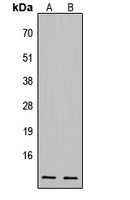
WB analysis of HUVEC (A), HeLa (B) whole cell lysates using GTX55259 CDK2AP1 antibody.
CDK2AP1 antibody
GTX55259
ApplicationsWestern Blot
Product group Antibodies
ReactivityHuman
TargetCDK2AP1
Overview
- SupplierGeneTex
- Product NameCDK2AP1 antibody
- Delivery Days Customer9
- Application Supplier NoteWB: 1:500 - 1:1000. *Optimal dilutions/concentrations should be determined by the researcher.Not tested in other applications.
- ApplicationsWestern Blot
- CertificationResearch Use Only
- ClonalityPolyclonal
- ConjugateUnconjugated
- Gene ID8099
- Target nameCDK2AP1
- Target descriptioncyclin dependent kinase 2 associated protein 1
- Target synonymsDOC1, DORC1, ST19, doc-1, p12DOC-1, cyclin-dependent kinase 2-associated protein 1, CDK2-associated protein 1, Deleted in oral cancer-1, deleted in oral cancer 1, putative oral cancer suppressor
- HostRabbit
- IsotypeIgG
- Protein IDO14519
- Protein NameCyclin-dependent kinase 2-associated protein 1
- Scientific DescriptionThe protein encoded by this gene is a cyclin-dependent kinase 2 (CDK2) -associated protein which is thought to negatively regulate CDK2 activity by sequestering monomeric CDK2, and targeting CDK2 for proteolysis. This protein was found to also interact with DNA polymerase alpha/primase and mediate the phosphorylation of the large p180 subunit, which suggests a regulatory role in DNA replication during the S-phase of the cell cycle. This protein also forms a core subunit of the nucleosome remodeling and histone deacetylation (NURD) complex that epigenetically regulates embryonic stem cell differentiation. This gene thus plays a role in both cell-cycle and epigenetic regulation. Alternative splicing results in multiple transcript variants encoding distinct isoforms. [provided by RefSeq, Jul 2012]
- ReactivityHuman
- Storage Instruction-20°C or -80°C,2°C to 8°C
- UNSPSC12352203




